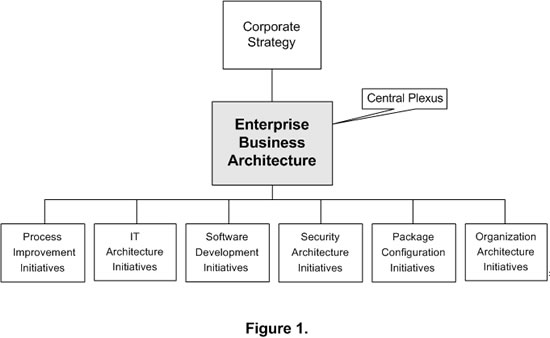Interest in Business Architecture (BA) initiatives, case study presentations and training classes are increasing, a sign of a maturing and evolving approach. BA is far from mature in terms of industry consensus and standards. The Business Architecture Working Group (BAWG) was formed back in December 2007 under the auspices of the Object Management Group (OMG), thus beginning the journey toward industry consensus and standards. The reader is encouraged to keep informed as to the progress of the BAWG, other similar BA initiatives and the results each will deliver.
Along the way to promoting industry consensus and developing a set of standards, the BA will occasionally lose its strategic focus, most likely pressured by those who are impatient or with self serving intentions. In the 21st century, everyone expects immediate results; at times, very impatient with the significant effort required to develop sound standards and approaches. For example, this happened during the evolution of Enterprise Architecture (EA) framework development and it is not an unusual occurrence.
Thinking metaphorically for a moment, Apple’s iPhone was a huge success, changing the so called “cell phone” paradigm. The iPhone 3GS was a GSM cell phone that was also an iPod, a video camera, mobile Internet device with email and GPS maps, and much more. Its delivery changed the marketplace, added another star to Apple’s crown and disrupted Apple’s competitors. While Apple’s competitors were perhaps looking at how to make other improvements in cell phone technologies or possibly looking at how to make them a little cheaper, Apple changed the “cell phone” paradigm. Along the way, for example, they received the 2007 “Best of What’s New Award” from Popular Science magazine. Maybe at times Apple felt the need to just get a new cell phone out to the marketplace, but it apparently never lost its strategic focus and the iPhone was a tremendous success.
Currently, the strategic focus of the Business Architecture seems is a little fuzzy when viewed from the perspective of some practitioners. For example, some BA practitioners wish to simply make the BA an extension of IT, wanting to place it within the confines of UML use case thinking. Accessorizing the IT domain with something similar to the BA is not unusual. Some attempts were made to do the same with Business Process Management (BPM). In the early days of BPM development, many wanted to confine BPM to UML use case thinking and a few still prefer this constrained approach. After all, at that time, many UML based tools were developing and UML acceptance was growing significantly.
Since most organizations are functionally oriented and most of existing IT is “function based,” many new to BA concepts and ideas assumed the boundaries of a “function based” paradigm. A few have even tried somehow to reclassify functions, to rename them, or to integrate two or three activities from different functional silos, labeling it with a more colorful existing moniker.
Taking another point of view, perhaps one should consider the BA as an extension of the corporate strategy rather than an extension of IT. Wait a minute! Maybe both of these ideas have some merit along with a few other extensions. What about an extension of BPM, of process improvement, of packaged software development, of organizational architecture development and of security architecture development? Why not build a BA approach that extends all of these paradigms and integrates them together? After all, an architecture is a structure with one element linked to other elements to form, collectively, a structure1. Perhaps considering the Business Architecture as an enterprise structure, a central plexus between the extensions of the domains and paradigms just mentioned is worthy of scrutiny and serious analysis. Please consider Figure 1 provided below2. Maybe the best way to build a Business Architecture is by taking an holistic view of the enterprise, creating artifacts of the business, governed by business people, and shared throughout the enterprise rather than simply creating an artifact of IT or BPM.
Today, some BA practitioners wish to remain comfortable with the BA as an extension of IT or BPM, and metaphorically speaking, wanting to deliver a slightly different “cell phone” or one that is a little cheaper. There is another alternative; a richly featured BA approach and method guided by a strategic focus will disrupt “IT or BPM extension thinking” and deliver a completely new paradigm or iPhone. Simply “tweaking” an existing paradigm is okay, but many more opportunities will abound with a new paradigm. Personal and distributed computing blew away the host computing paradigm and the Internet blew away the traditional brick and mortar paradigm. Will the same happen with the BA, or will it become a passing fad so typical of the fashion industry, or something in between; who knows? However, its success will depend on maintaining the strategic focus envisioned and determined by its creators, and hopefully, not limited by functional boundaries and current technology paradigms.
And finally, executive leadership should ask a very important and serious question. “Do they want to bring the extended enterprise environment to within their corporate leadership’s sphere of economic influence?” If the answer is yes, then which BA approach and method enables the achievement of this objective; a richly featured BA or one that is merely an extension of IT or BPM? Many practitioners are holding out for an exceptional BA approach and methodology, rich in capabilities and features, or metaphorically speaking, that paradigm changing iPhone; and believing it will be well worth the wait!
- Ivar Jocabson, Maria Ericsson and Agneta Jacobson The Object Advantage: Business Process Reengineering with Object Technology (ACM Press 1995), page 97.
- Ralph Whittle and Conrad Myrick, Enterprise Business Architecture: The Formal Link between Strategy and Results, © CRC Press 2004, Figure 1-1, page 5.
 |

















